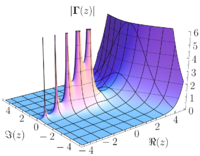
Back قطب (تحليل مركب) Arabic Полюс (комплексен анализ) Bulgarian Pol (anàlisi complexa) Catalan Pol (matematisk) Danish Polstelle German Πόλος (μιγαδική ανάλυση) Greek Poluso (kompleksa analitiko) Esperanto Polo (análisis complejo) Spanish Poolus (kompleksmuutuja funktsiooniteooria) Estonian قطب (آنالیز مختلط) Persian
| Mathematical analysis → Complex analysis |
| Complex analysis |
|---|
 |
| Complex numbers |
| Complex functions |
| Basic theory |
| Geometric function theory |
| People |
In complex analysis (a branch of mathematics), a pole is a certain type of singularity of a complex-valued function of a complex variable. It is the simplest type of non-removable singularity of such a function (see essential singularity). Technically, a point z0 is a pole of a function f if it is a zero of the function 1/f and 1/f is holomorphic (i.e. complex differentiable) in some neighbourhood of z0.
A function f is meromorphic in an open set U if for every point z of U there is a neighborhood of z in which at least one of f and 1/f is holomorphic.
If f is meromorphic in U, then a zero of f is a pole of 1/f, and a pole of f is a zero of 1/f. This induces a duality between zeros and poles, that is fundamental for the study of meromorphic functions. For example, if a function is meromorphic on the whole complex plane plus the point at infinity, then the sum of the multiplicities of its poles equals the sum of the multiplicities of its zeros.
© MMXXIII Rich X Search. We shall prevail. All rights reserved. Rich X Search